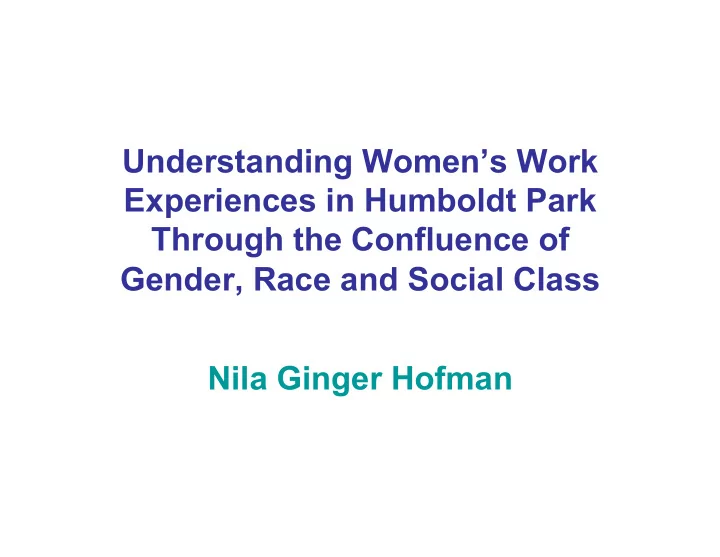

Understanding Women’s Work Experiences in Humboldt Park Through the Confluence of Gender, Race and Social Class Nila Ginger Hofman
Research for this project was supported by: • Women and Gender Research Initiative Fellowship • Faculty Research & Development Summer Grant • DePaul Student Research Assistant Support
Paseo Boricua
Community organizing
One experience of Humboldt Park I’m really scared. I live by North and Kedzie like three blocks from North Avenue and I walk with my daughter to North Avenue to the family dollar store, and I get scared, I do. Cause you never know who’s going to have the guts to do something during the day. I mean, I’m scared of Humboldt Park. I would take my daughter right here at the lagoon in Humboldt Park and feed the ducks. But then someone said they found a body in Humboldt Park on Friday, in the lagoon. Where I took my daughter to feed the ducks!
Another experience of Humboldt Park Besides logistic stuff like inexpensive rent I like the neighborhood more. It’s different [than] living in Lincoln Park or Lakeview. There is the whole yuppie thing that I kinda wanted to escape from anywhere that I lived on the east side of city. And I didn’t like experiencing that kind of…attitude. There is something that is more down to earth about Humboldt Park.
Research questions: • How do Humboldt Park women experience the neighborhood? Do they take advantage of local services and amenities? • How do they balance the demands of household labor and their participation in the labor market? • What does the intersectional approach reveal about women’s lived experiences in a particular place and time?
Intersectional approach: An intersectional approach theorizes women’s oppression as a function not just of gender, but also race, class, and, above all, the multivalent interplay of these forces. The intersectional approach, recognizing that no system of oppression is more primary than any other, situates women’s lives at the center of a matrix of mutually reliant systems of oppression.
Themes that surfaced from the interviews: The cultural meanings of work/education Responses to neighborhood changes Obstacles and aspirations for the future
Conclusion The current social and economic upheavals in the Humboldt Park neighborhood amplify the different ways in which women relate to the neighborhood and negotiate a sense of self. Humboldt Park’s economic transformation, brought on largely by the downsizing of the local labor market, is reflected by the dramatically different experiences of women in the neighborhood.
Recommend
More recommend